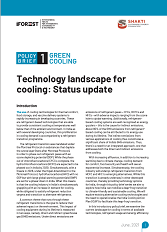
Undertaken By: International Forum for Environment, Sustainability and Technology (iFOREST) , Recent Publication: 2021
With heat waves sweeping across cities in India, the need for cooling solutions is more urgent than ever. India’s cooling demand is projected to grow by eight times in the next 20 years. This will lead to a significant increase in cooling demand, stress on the electricity grid and the release of high Global Warming Potential (GWP) refrigerants like HFCs.
The landmark Kigali Amendment aims to phase down potent GWP refrigerants through energy efficiency measures. The India Cooling Action Plan (ICAP), launched in March 2019, sets out ambitious measures to reduce cooling and energy demand over the next two decades. One of the goals of the ICAP is to reduce refrigerant demand by 25-30% though multiple strategies such as the adoption of non-refrigerant cooling technologies, shift to low-GWP refrigerants, reduction in leakages from appliances and recovery, recycling, and reuse of refrigerants from existing equipment. This initiative seeks to find ways to mainstream sustainable cooling technologies in India, including natural refrigerants, in order to support the goals of the ICAP.